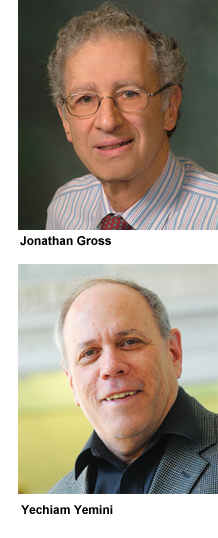Year: 2017
Computer Science Department establishes Jonathan Gross Prizes to recognize top CS graduates
![]()
 Beginning this spring, five graduating computer science students—one senior from each of the four undergraduate schools and one student from the master’s program—will be selected to receive the Jonathan Gross Prize. The prize honors students who graduate at the top of their class with the highest overall GPA and a track record of promising innovative contributions to computer science. Students will be recommended for the prize by the department chair, with final recipients selected by a majority vote of the faculty.
Beginning this spring, five graduating computer science students—one senior from each of the four undergraduate schools and one student from the master’s program—will be selected to receive the Jonathan Gross Prize. The prize honors students who graduate at the top of their class with the highest overall GPA and a track record of promising innovative contributions to computer science. Students will be recommended for the prize by the department chair, with final recipients selected by a majority vote of the faculty.
The prize is being made possible by an endowment set up by Yechiam (Y.Y.) Yemini, who for 31 years until his retirement in 2011 was a professor of computer science at Columbia. “This university has amazing students, and they deserve to have their academic accomplishments recognized by faculty and their fellow students; in recognizing them, we inspire a culture of excellence.”
The prize recognizes students while honoring Jonathan L. Gross for his 47 years teaching at Columbia, first in the Mathematical Statistics Department and then as a cofounder of the Computer Science Department.
“Jonathan Gross built and led the CS department education program for several decades,” says Yemini. “His continuing contributions to developing CS education over several decades defined his role as the ‘father’ of CS education at Columbia.”
Though primarily a mathematician, Gross had an early interest in computers and believed computing was for everybody. He was Acting Chair of Mathematical Statistics when SEAS committed funds in 1978-1979 to found the Computer Science Department. Gross’s role in starting the new department was fundamental; among his first initiatives, Gross merged the computer science courses that were concurrently being offered by both the Mathematical Statistics and the Electrical Engineering departments. As the new Computer Science Department grew from just a few professors in its first year—it now numbers almost 50 professors and five teaching-oriented faculty—Gross organized department-wide efforts to keep the academic curriculum at the educational forefront.
“I am deeply appreciative that my dear friend YY has honored me by associating my name with this wonderful award he has endowed,” says Gross, now professor emeritus. “It is a wonderful way to recognize the academic excellence of our students.”
For his part, Yemini says he feels fortunate to have the opportunity to help ensure that the legacy of excellence begun by Gross continues. Yemini’s Columbia research lab pioneered a range of seminal network technologies, from autonomic self-managing networks, to microeconomic network control, to high-speed switches and (what became two decades later) software-defined networks. The coauthor of over 100 refereed publications and a holder of 30 patents, Yemini is also a serial entrepreneur who cofounded five high-tech startups. Three of those startups grew out of technologies developed in his Columbia Lab and employ Columbia graduates. His most recent startup, Turbonomic.com (2009), just celebrated its 24th continuous quarter of record revenues growth, raising $50M investment to value the company at over $800M. Turbonomic’s R&D team includes scores of Columbia graduates in its NYC and Westchester offices.
Now professor emeritus and officially retired, Yemini continues to develop Turbonomic technologies while also teaching the popular Columbia Course “Principles of Innovation and Entrepreneurship (PIE)” and supporting philanthropic projects.
Julia Hirschberg, chair of the Computer Science Department, will announce and distribute the first Jonathan Gross Prizes this May at the graduation reception for computer science students. “This is a wonderful gift by a great emeritus faculty, YY Yemini, to honor another great emeritus, Jonathan Gross. The Department could not be more pleased.”
– Linda Crane
Posted 3/20/2017
Lights! Camera! Algorithms? Columbia Magazine features research of Eitan Grinspun
In creating Moana and other animated movies, artists at Walt Disney Animation Studios use techniques developed by Grinspun and his students to give characters lifelike hair that flows, bounces, and twists.
Awesome people: Kathy McKeown profiled in natural language processing blog
“Whenever a new topic becomes popular in NLP, we find out that Kathy worked on it ten years ago.”
What if Quantum Computers Used Hard Drives Made of DNA?
5 ways deep learning improves your daily life
What the CIA WikiLeaks dump tells us: Encryption works
IBM inches toward human-like accuracy for speech recognition
WikiLeaks’s CIA hacking trove doesn’t live up to the hype
WikiLeaks’s statement that CIA can bypass encryption in apps is misleading, says Steven Bellovin
Encryption is strong in WhatsApp, Signal, and other apps, Bellovin explains in a blog post, forcing the CIA to hack the endpoints (phones) and collect data before it is encrypted.

